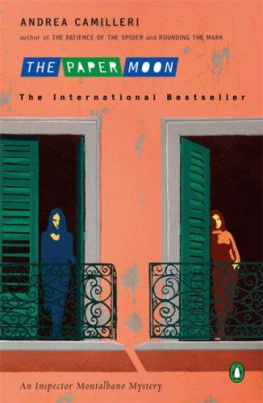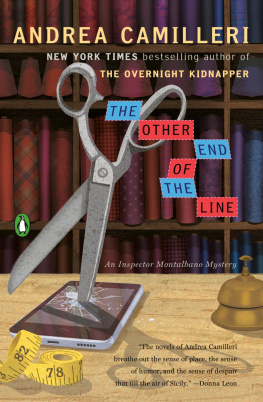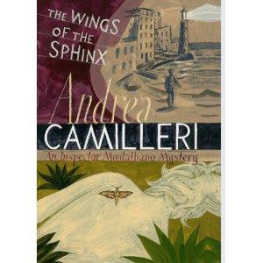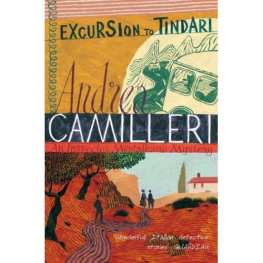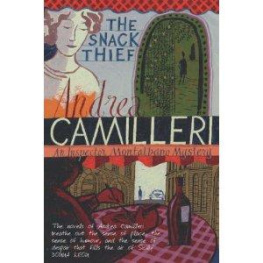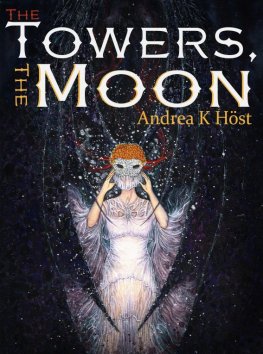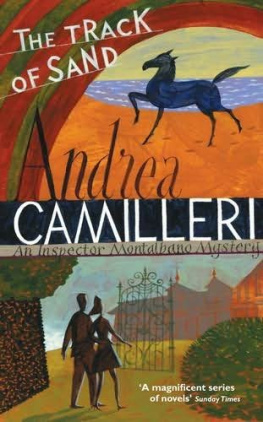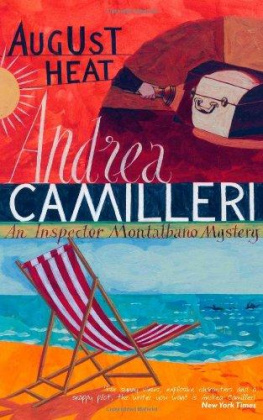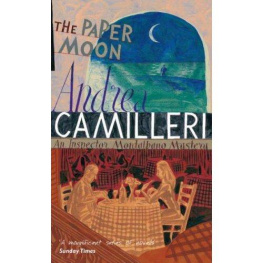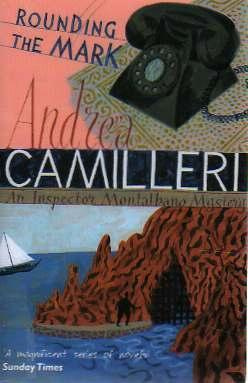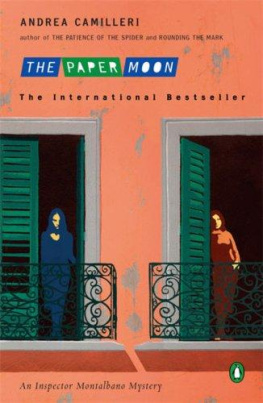Andrea Camilleri - Paper Moon
Here you can read online Andrea Camilleri - Paper Moon full text of the book (entire story) in english for free. Download pdf and epub, get meaning, cover and reviews about this ebook. year: 2009, publisher: Picador, genre: Detective and thriller. Description of the work, (preface) as well as reviews are available. Best literature library LitArk.com created for fans of good reading and offers a wide selection of genres:
Romance novel
Science fiction
Adventure
Detective
Science
History
Home and family
Prose
Art
Politics
Computer
Non-fiction
Religion
Business
Children
Humor
Choose a favorite category and find really read worthwhile books. Enjoy immersion in the world of imagination, feel the emotions of the characters or learn something new for yourself, make an fascinating discovery.
- Book:Paper Moon
- Author:
- Publisher:Picador
- Genre:
- Year:2009
- Rating:4 / 5
- Favourites:Add to favourites
- Your mark:
- 80
- 1
- 2
- 3
- 4
- 5
Paper Moon: summary, description and annotation
We offer to read an annotation, description, summary or preface (depends on what the author of the book "Paper Moon" wrote himself). If you haven't found the necessary information about the book — write in the comments, we will try to find it.
Paper Moon — read online for free the complete book (whole text) full work
Below is the text of the book, divided by pages. System saving the place of the last page read, allows you to conveniently read the book "Paper Moon" online for free, without having to search again every time where you left off. Put a bookmark, and you can go to the page where you finished reading at any time.
Font size:
Interval:
Bookmark:
THEPAPER MOON
ANDREA CAMILLERI
Translated by Stephen Sartarelli
PENGUIN BOOKS
penguin books Published by the Penguin Group Penguin Group (USA) Inc., 375 Hudson Street, New York, New York 10014, USA Penguin Group (Canada), 90 Eglinton Avenue East, Suite 700, Toronto, Ontario M4P 2Y3, Canada (a division of Pearson Penguin Canada Inc.) Penguin Books Ltd., 80 Strand, London WC2R 0RL, England Penguin Ireland, 25 St. Stephen's Green, Dublin 2, Ireland (a division of Penguin Books Ltd) Penguin Group (Australia), 250 Camberwell Road, Camberwell. Victoria 3124, Australia (a division of Pearson Australia Group Pty Ltd) Penguin Books India Pvt Ltd, 11 Community Centre, Panchsheel Park, New Delhi110 017, India Penguin Group (NZ), 67 Apollo Drive, Rosedale, North Shore 0632, New Zealand (a division of Pearson New Zealand Ltd) Penguin Books (South Africa) (Pty) Ltd., 24 Sturdee Avenue, Rosebank,Johannesburg 2196, South Africa
Penguin Books Ltd, Registered Offices: 80 Strand, London WC2R 0RL, England
First published in Penguin Books 2008
Translation copyright Stephen Sartarelli, 2008 All rights reserved
Originally published in Italian as La luna di carta by Sellerio Editore, Palermo. Copyright 2005 Sellerio Editore.
Publisher's Note
This is a work of fiction. Names, characters, places, and incidents either are the product of the author's imagination or are used fictitiously, and any resemblance to actual persons, living or dead, business establishments, events, or locales is entirely coincidental.
ISBN: 1-4362-0783-5
CIP data available
Set in Bembo Designed by Jaye Zimet
Except in the United States of America, this book is sold subject to the condition that it shall not, by way of trade or otherwise, be lent, resold, hired out, or otherwise circulated without the publisher's prior consent in any form of binding or cover other than that in which it is published and without a similar condition including this condition being imposed on the subsequent purchaser.
The scanning, uploading and distribution of this book via the Internet or via an other means without the permission of the publisher is illegal and punishable by law. Please purchase only authorized electronic editions, and do not participate in or encourage electronic piracy of copyrighted materials. Your support of the author's rights is appreciated.
The alarm rang, as it had done every morning for the past year, at seven-thirty. But he had woken up a fraction of a second before the bell; the release of the spring that set off the ringing had sufficed. He therefore had time, before jumping out of bed, to look over at the window and realize, from the light, that the day promised to be a fine one, without clouds. Afterwards he just barely had time to make coffee, drink a cup, do what he needed to do, shave and shower, drink an other cup, fire up a cigarette, get dressed, go outside, get in his car, and pull up at the station at nineall at the slapstick speed of Larry Semon or Charlie Chaplin.
Up until one year earlier, his morning wake-up routine had followed different rules, and, most of all, there was no rush, no hundred-meter dashes.
First, no alarm clock.
Montalbano was in the habit of opening his eyes natu rally after a night's sleep, with no need of external stimuli. He did have an alarm clock of sorts, but it was inside him, buried somewhere in his brain. He merely had to set it be-fore falling asleep, telling himself, Don't forget you have to get up tomorrow at six, and the next morning his eyes would pop open at six o'clock sharp. He'd always considered the alarm clock, the metal kind, an instrument of torture. The three or four times he'd had to use that drill-like noise to wake up because Livia, who had to leave the next morning, didn't trust his inner alarmhe'd spent the rest of the day with a headache. Then Livia, after a squabble, bought a plastic alarm clock that instead of ringing made an electronic sound, a kind of unending beeeeeep, rather like a little fly that had found its way into your ear and got stuck inside. Enough to drive you crazy. He'd ended up throwing it out the window, which triggered another memorable spat.
Second, he would wake himself up, intentionally, a bit earlier than necessary, some ten minutes earlier at the very least.
These were the best ten minutes of the day ahead. Ah, how wonderful it was to lie there in bed, under the covers, thinking of idiocies! Should I buy that book everybody's calling a masterpiece, or not? Should I eat out today, or come home and scarf down what Adelina's prepared for me? Should I or shouldn't I tell Livia that I can't wear the shoes she bought me because they're too tight? That sort of thing. Poking about with the mind. While carefully avoiding, however, any thought of sex or women. That could be dangerous terrain at that hour , unless Livia were there sleep ing beside him, ready and happy to face the consequences.
One morning a year earlier, however, things had suddenly changed. He had barely opened his eyes, calculating that he had a scant fifteen minutes to devote to his mental dawdlings, when a thoughtnot a whole one, but the start of one came into his mind, and it began with these exact words:
"When your dying day comes..."
"What was this thought doing there with the others? How gutless! It was like suddenly remembering, while making love, that he hadn't paid the p hone bill. Not that he was inor dinately frightened by the idea of dying; the problem was that six-thirty in the morning was hardly the proper time and place for it. If one started thinking about death at the crack of dawn, certainly by five in the afternoon one would either shoot oneself or jump into the sea with a rock around one's neck. He managed to prevent that phrase from proceeding any further, blocking its path by counting very fast from one to five thousand, with eyes shut and fists clenched. Then he realized that the only solution was to set about doing the things he needed to do, concentrating on them as though it were a matter of life or death. The following morning was even more treacherous. The first thought that entered his mind was that the fish soup he'd eaten the night before had lacked some seasoning. But which? And at that exact moment, the same accursed thought came back to him:
"When your dying day comes..."
As of that moment, he realized that the thought would never go away again. It might lie buried deep inside some curlicue in his brain for a day or two only to pop back out into the open when he least expected it. For no reason he became convinced that his very s urvival depended on pre venting that sentence from ever completing itself. For if it did, he would die when the last word came.
Hence the alarm clock. To leave not even the slightest fissure in time for that accursed thought to slip through.
"When she came to spend three days in Vigata, Livia, as she was unpacking, pointed at the nightstand and asked: "What's that alarm doing there?" He answered with a lie.
"Well, a week ago I had to get up really early and" "And a week later it's still set?"
When she put her mind to it, Livia was worse than Sherlock Holmes. Slightly embarrassed, he told her the truth, the whole truth, and nothing but the truth. Livia burst out:
"You're demented!"
And she buried the alarm clock in a drawer inside the armoire.
The following morning it was Livia, not the alarm, that woke Montalbano. And it was a beautiful awakening, full of thoughts of life, not death. But as soon as she left, the clock was back on the nightstand.
"Aahh, Chief, Chief!" "What is it, Cat?"
"There's some lady waiting for you." "For me?"
"She din't say what it was f'you poissonally in poisson, she just said she wanted a talk to somebody from the police." "So why couldn't she talk to you?"
Next pageFont size:
Interval:
Bookmark:
Similar books «Paper Moon»
Look at similar books to Paper Moon. We have selected literature similar in name and meaning in the hope of providing readers with more options to find new, interesting, not yet read works.
Discussion, reviews of the book Paper Moon and just readers' own opinions. Leave your comments, write what you think about the work, its meaning or the main characters. Specify what exactly you liked and what you didn't like, and why you think so.

